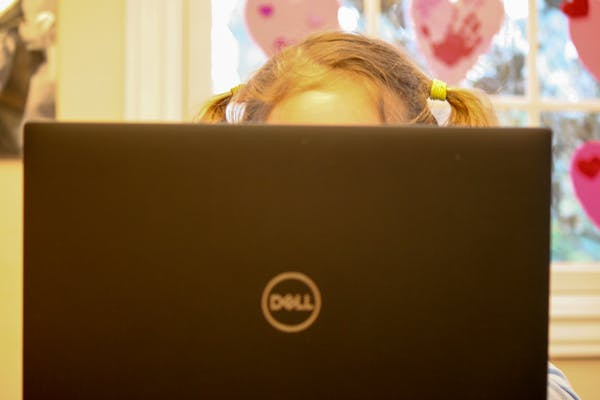Public and private schools across the nation are closing their doors as everyone scrambles to protect themselves from the COVID-19 viral disease pandemic.
With little or no time to prepare for this disruption, families from Seattle to the New York City suburbs are suddenly having to figure out how to help their kids learn at home. This is an unprecedented effort.
Indiana University, where I teach, recently announced that we’ll stop offering in-person classes and move all instruction online after spring break ends on March 22. On top of setting up live-streaming channels for the 250 students in my Introduction to Sociology class, I revamped the course requirements for students who can’t connect online.
Another step: I put locks on my home office door so I don’t end up like this professor in South Korea whose interview went viral when his kids wandered into the camera’s line of sight. My 5-year-old and 2-year-old are cute, but I don’t want them barging in and disrupting my classes now that their school and day care center are closed.
My concern with these disruptions, however, isn’t for professors and parents like me — it’s for elementary, middle and high school students from low-income families. They rely on schools for food and health services while their parents are at work. Those students also face significant barriers to academic success, and their families can’t easily set up a school-like environment — with computers, quiet spaces to work and hands-on support — to keep them learning while they’re stuck for weeks at home.
Digital divide
Low-income families might also have trouble keeping their children learning because they can’t afford the necessary technology. That digital divide — a measure of inequalities in access to reliable computers or tablets and high-speed internet — becomes much more problematic when kids need digital devices to learn at home.
While some schools give students laptops or tablets to use, those programs are far from universal. Instead, low-income students are significantly less likely to have the equipment and bandwidth they need to livestream classes from home.
About 15% of all U.S. families with school-age children lacked high-speed internet as of 2015. Among families with incomes of US$30,000 or less, the share without that access was more than twice as big.
Meanwhile, even elementary-aged children who have access to digital technology may need considerable help from parents to use those devices for learning at home.
Consequences for students
Although closing schools may slow the spread of the new coronavirus, widespread, prolonged closures may deepen inequalities in students’ test scores and in how teachers treat individual students.
It’s often challenging for low-income students to get their homework done correctly and turned in on time. Those students are also more likely than more affluent kids to face consequences related to homework — losing points due to missed or late assignments, being deprived of recess, being chastised in front of their classmates and getting their grades docked.
Similarly, low-income students without access to technology lag behind their wealthier peers in reading and math. Those students are also more likely to fail to complete their homework because they lack a reliable computer or internet connection at home.
As school leaders decide how to proceed, I encourage them to be mindful of the unequal burden closures will place on students and their families. That means accepting that not all parents are equally able to help their kids keep up academically during this disruptive time.
###
Join our growing Slack community
Join 5,000 tech professionals and entrepreneurs in our community Slack today!
Donate to the Journalism Fund
Your support powers our independent journalism. Unlike most business-media outlets, we don’t have a paywall. Instead, we count on your personal and organizational contributions.

Maryland firms score $5M to manufacture everything from soup to nanofiber

National AI safety group and CHIPS for America at risk with latest Trump administration firings

Immigration-focused AI chatbot wins $2,500 from Temple University to go from idea to action


